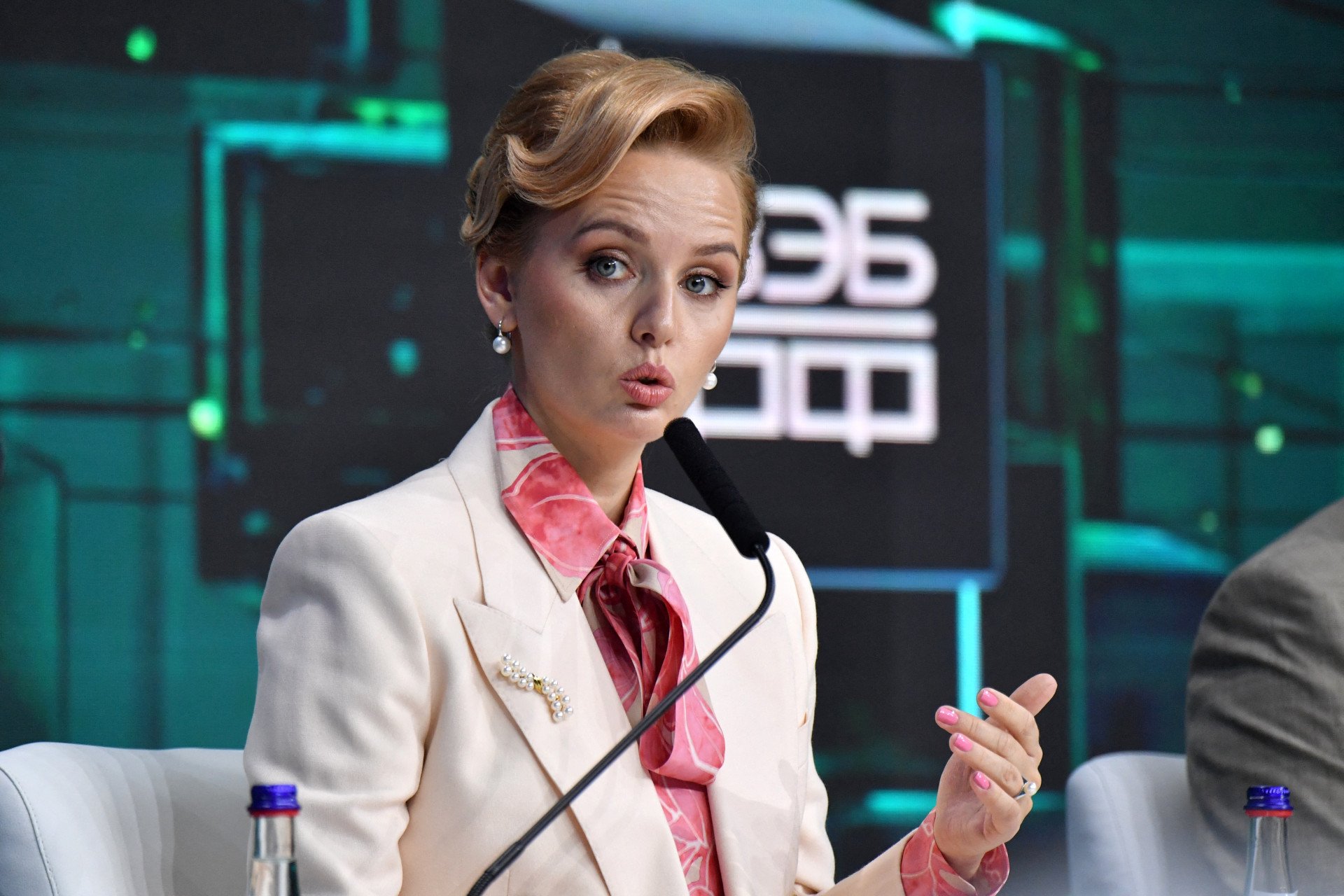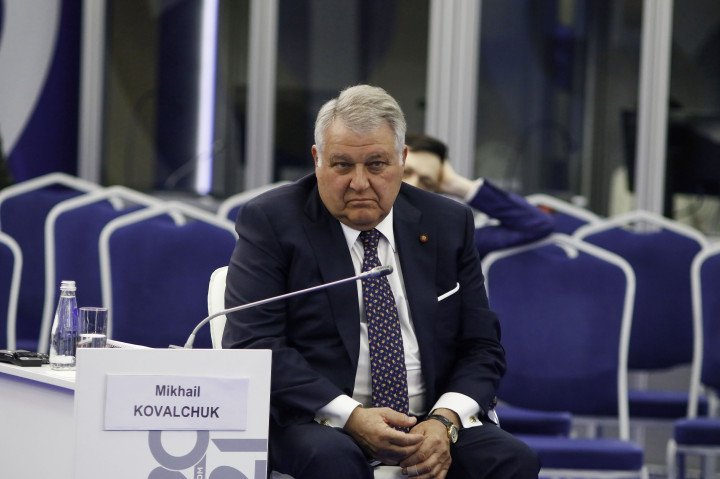- Category
- War in Ukraine
How Putin’s Daughter Made Millions From Anti-Aging and Genetic Research Projects for Russia’s Elite

As Russian citizens pay out of pocket for basic healthcare, Putin’s sanctioned daughter earns millions from state-funded anti-aging and genetic projects built for its elites chasing eternal life.
Maria Vorontsova , the eldest daughter of Russian leader Vladimir Putin, is now publicly positioned as a major scientist with a “world-class laboratory” after winning a state-funded grant from the Russian Science Foundation (RSF).
The grant supports her latest project, “Regulation of cell renewal processes in the body, the fundamental basis for long-term preservation of functional activity of organs and tissues, human health, and active longevity.” In effect, its focus is anti-aging.
However, Vorontsova's Hirsch Index is extremely low, far lower than other scientists in her field, according to an investigation by T-invariant . Her Hirsch index is 5, whereas other scientists and winners of the 2025 grant range from 30 to 60. Awarding such a distinction to someone with minimal academic impact is highly unusual.
Vorontsova has led several state-funded programs in genetics and healthcare that align with the Kremlin's strategic interests while receiving substantial funding, raising questions about transparency, financial benefit, and conflicts of interest.
Historically, very little was published about Vorontsova’s scientific work in international publications, and according to reports, official Russian sources only started publicly publishing her scientific background in December 2022.
Her involvement in these programs and close ties to the Russian government have led to sanctions by the US, UK, EU, Japan, and New Zealand.
“Vorontsova directs state-funded programs that have received billions of dollars from the Kremlin for genetic research and are personally overseen by Putin,” the US Department of the Treasury’s Office confirmed while applying the sanctions in 2022.
What do we know about Maria Vorontsova?
Vorontsova is the Deputy Dean at Moscow State University, one of Russia’s leading institutions. Her appointment, conducted in secret and criticized as an example of cronyism later came to light through independent investigation.
Vorontsova’s ex-husband, Jorrit Joost Faassen of the Netherlands, was appointed Director of Business Development at Gazprom in 2007. Gazprom—sanctioned internationally and closely overseen by Putin—has also deployed private military companies to support Russia’s war in Ukraine.
Vorontsova completed her undergraduate studies in biology at Saint Petersburg State University and graduated from the Faculty of Medicine at Moscow State University in 2011, according to SciProfiles.
From 2011 to 2014, Vorontsova was a resident at the Institute for Paediatric Endocrinology, Endocrinology Research Centre, where she completed her PHD in 2017. Currently, she is a Senior scientific fellow at the Endocrinology Research Centre.
In a rare interview, Putin’s daughter Maria Vorontsova says that human life is a "supreme value" for Russian society
— Francis Scarr (@francis_scarr) January 12, 2024
I wonder if those swept up in her father’s "partial mobilisation" and sent to the likes of Bakhmut or Maryinka would agree pic.twitter.com/FX4reOmirs
The Kremlin’s aged elite want to live forever
In early 2024, Russia revealed “New Health Preservation Technologies,” a program focused on anti-aging. Russian Deputy Prime Minister Tatyana Golikova said the initiative would invest in “technology that prevents cellular aging, neurotechnologies, and other innovations aimed at ensuring longevity,”.
Mikhail Kovalchuk , 77, who is “crazy about eternal life,” reportedly rushed to his close friend, Putin, who is turning 72 this year, with the idea of the program.
Russian authorities claimed that the program will “save 175,000 lives,” meanwhile, more than 95,000 Russian soldiers have been confirmed killed in its war in Ukraine. Other reports have estimated the total as of July 2024 to be nearer 140,000.
One research centre employee working on the program told The Times, “As if we have no one to put back on their feet but these boneheads.”
Kovalchuk also oversees Russia’s genetic research program, alongside Vorontsova, and has promoted several “bizarre” ideas and conspiracies. From existing biological weapons exclusively targeting Russians, to the US creation of a “subspecies of human” living on “cheap feed” produced from “genetically modified organisms.” According to reports, even Putin believes in some of Kovalchuk’s wild theories.

How Vorontsova is making millions of dollars through state-funded science
Vorontsova is co-owner of the company Nomeko (New Medical Company), which, according to reports, was involved in one of the largest investment projects in Russian healthcare costing an estimated 40 billion rubles.Nomeko bought SOGAZ Clinics, a clinic known to have treated Wagner mercenaries and the Russian ruling elite for free.
By January 2024, three years of this Nomeko ownership, Vorontsova’s income amounted to almost a billion rubles ($12 million), according to T-Invariant.
Vorontsova has a specific interest in genetic technologies and editing. Vorontsova is a board member of the Moscow Society of Medical Genetics, involved in advancing genetic research and education, projects in which Putin personally oversees.
Russia, financially backed by Rosneft , allocated 127 billion rubles ($1.7 billion) to a state program (ANO) “Development of Genetic Technologies”, of which Vorontsova is the informal supervisor. In 2021, reporters estimated that the “Kremlin’s overall spending on projects involving genetics could actually reach 230 billion rubles ($3 billion) in the coming years.”
Putin has likened the technology to a nuclear bomb, even citing the possibility of creating soldiers who feel no pain.
A video published in January 2024 by Anti-Corruption Foundation (FBK) discusses Vorontsova’s public-funded monetary gains as a doctor and working in science: “Everyone knows that doctors in Russia are underpaid very much.” They say that she created a “special financing channel. Putin's blood flows in her, which means that Maria Vorontsova needs money and a certain way of life."
FBK claimed that a licensed endocrinologist in Russia typically earns between 22,000 and 27,000 rubles (around $330) a month after tax deduction.
FBK claims that Vorontsova earns 110,000 rubles (1,326.10 US Dollar) at the Moscow State University, citing a salary extract they obtained. FBK also claims that she earns 35,000 rubles (421.92 US Dollar) from the Endocrinology Association, and another 48,000 rubles (578.63 US Dollar) from the National Medical Research Centre for Endocrinology.
According to reports, in 2020 alone, 232 million rubles were transferred to Vorontsova’s personal accounts in the form of dividends, while also receiving a salary of 700,000 rubles.
“They (Russian authorities) figured, if not tomorrow then in a few years' time, they’d be able to pop into an outpatient clinic (or maybe a special clinic) and get some kind of genetic correction, and they’d live longer and never get cancer,” Russia’s genetic researcher said.
Another scientist joked with reporters about Russia’s ideas on genetics, “It’s like the guys at the top thought it would be possible to gain immortality through genetics.”
In today's #vatniksoup, I'll introduce a Russian pediatric endocrinologist and businesswoman, Maria Vorontsova née Putina. She's best-known for being the daughter of Vladimir Putin, supporting the Kremlin's genocidal war on Ukraine, and for living a lavish life in the West.
— Pekka Kallioniemi (@P_Kallioniemi) March 25, 2024
1/19 pic.twitter.com/YP6GYENJa4
Russia’s out-of-pocket healthcare system is failing
Russia’s public services are facing chronic issues, the Centre for Eastern Studies (OSW) reported. The crisis is evident in critical sectors such as healthcare, which stems from insufficient funding. While major cities like Moscow and St. Petersburg have well-equipped facilities, rural and remote areas suffer.
2025 has seen a decline in hospital beds, nurses, and pharmacists available per 1000 inhabitants across Russia. The country ranks 56th out of 97 countries worldwide for quality of care. The Russian healthcare system “significantly lags behind other modern countries,” the National Library of Medicine reported.
An estimated 17,500 towns and villages in Russia have no medical infrastructure at all.
Russian citizens have access to free healthcare under the Federal Compulsory Medical Insurance Fund (FOMS), however, Russia has one of the highest consumer expenditures on healthcare.
While Russia promises free health care under the "Healthy Russia" initiative and the "Rural Doctor" programs, ordinary civilians pay around 30-40% of healthcare costs from their own pockets.
In 2019 and 2020, the aforementioned genetics study program alone received 19.2 billion rubles ($250.4 million) in federal funding, representing around 2.7% of all funding for Russia’s non-military scientific research.
Vorontsova is pocketing millions in taxpayer-funded state funding to fulfill the aging elite’s pursuit of longer life. Wagner mercenaries and the Russian elite were receiving medical care for free through Vorontsova’s medical institutions. Meanwhile, the general Russian civilian population is digging deep into their pockets to pay for basic needs.
-46f6afa2f66d31ff3df8ea1a8f5524ec.jpg)
-35249c104385ca158fb62273fbd31476.jpg)


-554f0711f15a880af68b2550a739eee4.jpg)



-206008aed5f329e86c52788e3e423f23.jpg)